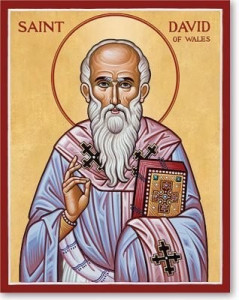 Of all the saints, St David (Dewi Sant) is the least celebrated and understood by the Catholic Church. Yet, Welsh (Cymraeg) is one of the oldest languages in Europe. Spoken by the people in Wales, in some areas of west England and Scotland, this is the language used when the Romans invaded these Isles. It was commonly used until at least 700AD, when the people migrated to the extreme west and developed their culture and distinct customs, including poetry and beliefs.
Of all the saints, St David (Dewi Sant) is the least celebrated and understood by the Catholic Church. Yet, Welsh (Cymraeg) is one of the oldest languages in Europe. Spoken by the people in Wales, in some areas of west England and Scotland, this is the language used when the Romans invaded these Isles. It was commonly used until at least 700AD, when the people migrated to the extreme west and developed their culture and distinct customs, including poetry and beliefs.
It evolved from Brythonic and Goidelic languages that formed Breton, Cornish and Welsh. Hence the word Briton is derived from the Welsh brython.
Even though David was born in the south west of Wales c 500 and founded monasteries and was revered for his teaching which later spread among Christians, he was not recognised by the Church until 1120, by Pope Callixtus II marking his death on March 1st c. 589, as the national patron of Wales. St David was not always recognised for his role in the Church or within British society and the Welsh were often ridiculed in the 18th Century by their English neighbours who called them taffies – gingerbread men! This being in relation to the early years of fighting for independence from the Anglo Saxons.
This attitude was due to a pact with the Celts of Dublin, Scotland and Breton to defeat the Anglo Saxons when a poem was composed in the mid-10th century Armes Prydein (The Prophesy of Britain), stating that the Welsh will unite with them, under the banner of St David against the enemies of the faith. Hence the dragon being a symbol of power and strength.
However, what joins the nations today is the love of the national flower, the daffodil and the leeks and more so, their famous Welsh Rarebit – cheese on toast but with that special mix of ale and mustard!
Today, Wales enjoys eisteddfod – celebrating its history, cultural music and literature. Dylan Thomas brought attention to the unique culture of Wales and remains a famous figure of verse and prose. Like many countries around the world, Wales maintains its love of language and tradition and encourages many to return to their native tongue to feel the true meaning of its heart and spirit. Cenedl heb iaith, cenedl heb galon meaning: ‘a nation without a language is a nation without a heart.’
Dewi Sant was a simple and humble man and his final words sum up his life: Gwnewch y pethau bychain. “Do the simple things” to make a difference.

Ac yno yn y dyffryn tawel mi glywaf gân yn swn yr awel. And in the quiet alley I hear a song in the sound of the breeze.
Brecon Beacons – South Wales.
